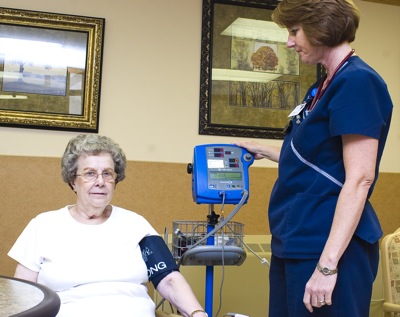Wednesday, June 16th, 2010
Loose lips sink identity
By Shelley Grieshop

Photo by Shelley Grieshop/The Daily Standard
Ken Goettemoeller of First Financial Bank, Celina, speaks to the public about preventing identity theft. Also standing Auglaize County Sheriff Al Solomon, left, U.S. Federal Trade Commission representative Kate Caffie and Mercer County Sheriff Jeff Grey.
CELINA - Wherever we go - the mall, grocery stores, restaurants - we're asked for information.
Name, address, phone number, e-mail address, Social Security number ... how free should we be with our personal data?
Wendi Faulkner of the Ohio Attorney General's office said it's OK to be tight-lipped.
"You're not being rude, you're being shrewd, so ask questions," she told a crowd of more than 60 people who gathered at Wright State University Lake-Campus in Celina on Tuesday night for a program on identity theft prevention.
Often store clerks ask for phone numbers and e-mail addresses, she said. The best response is "no," she said.
"Guess what? They're still going to check you out. They want your business. They don't have to have that information," Faulkner said.
Faulkner and Kate Claffie of the U.S. Federal Trade Commission in Washington, D.C., joined local law enforcement, a banker and a U.S. postal representative to teach residents what they can do to fight identity theft.
Earlier Tuesday, police, deputies and troopers from nine area counties learned how to help identity theft victims by taking reports and honing techniques to track the criminals. This morning, Attorney General Richard Cordray visited the campus to speak on the subject.
"Identity theft is the fastest growing crime in the U.S.," he said, adding it's spurred by the conveniences and technology available today.
He advised consumers to seek a free credit report each year from the three national credit agencies - Equifax, Experian and Transunion - to confirm criminals haven't compromised their credit score.
"You may not know until your credit is denied," said Cordray, an attorney and former treasurer for the state of Ohio.
His office has found that criminals have gotten much smarter over the years.
"The thing about predators is they are very creative, persistent and very hard to track down," Cordray said. "Keeping up with the bad guys is a full-time job. There's always new scams out there. It's a constant battle."
In the end, each individual must be their own watchdog, he explained.
"No one will protect you as well as you will. No one has the incentive that you have," he added.
Following Cordray's speech, area financial institutions were educated on the subject and taught how to protect their customers from becoming victims.
Identity theft is a growing crime across the globe. Stolen information is used to tap into bank accounts, buy merchandise and obtain services at the expense of others. Every six seconds somebody falls victim, Faulkner said.
It often takes 600 hours of work to resolve a victim's case and get their life back to normal, she added.
"Businesses (in the U.S.) spend $50 billion each year fighting identity theft," Faulkner explained.
She told the audience she wasn't there to scare them.
"I just want you to learn to ask questions. Ask why someone wants your information and do they really need it," she said.
Businesses sometimes request a Social Security number just because it's a practice they've always done, Faulkner said. They really don't need it, she added.
"Some have a right to refuse your business if you don't give it, but there's always someone else who'll take your money," she said with a smile.
Several people in attendance questioned how to handle various scenarios. An elderly man said recently an agency asked him for his mother's maiden name and the last four digits of his Social Security number.
"Should you give out stuff like that?" he asked.
Claffie reiterated Faulkner's advise: "Ask why they need it."
Claffie also urged residents, when asked, to use a different name other than their mother's maiden name for security purposes.
"Sometimes I use the name of my dog. They don't know that," she said, prompting a laugh from the crowd.
One purpose of the session was to teach residents what steps to take if their identity information is compromised. First and foremost, she urged victims to file a police report - even if they only think they've been scammed -to get the recovery process started as soon as possible.
The Attorney General's office offers a Passport Identity Theft Program that gives victims official documents to show banks, law enforcement and others who may question their identity or other status.
"We try to get people back to a new normal," Faulkner said.
A Passport identity card is proof but not a "get out of jail free card," Faulkner said.
"We don't have a 100 percent fail-proof method to protect you. No one can stop this but we will help you recover," she said.
Claffie said the federal agency also offers numerous ways to help victims get their lives back. They have counselors available to answer questions 9 a.m.-8 p.m. weekdays, she said. The information they gather from victims helps law enforcement across the country work together to nab the bad guys, she added.
"We cannot solve your problem, but we can give you resources," she said, adding the state's attorney general's office should be the first place to call.
Mercer County Sheriff Jeff Grey and Auglaize County Sheriff Al Solomon jointly sponsored the two-day event and were present at the public session.
"I've learned so much today. It really is a continual learning process," Grey said. "We have to learn what resources are out there and how they work so we can help the people we serve."
Tips to prevent theft:
• When it's necessary to give information in a public setting such as an emergency room, write it instead of stating it for others to hear. Also, request the paper be returned to you when finished.
• Shield important papers and data from repairmen or others who enter your home.
• Never give bank account or other information over the phone. If you question the identity of the caller, such as your bank representative, hang up and call them back.
• Ladies: Don't sling purses across the back of your chair in public; thieves can easily nab it and walk away. Also, placing your purse in the trunk of your parked car isn't safe either. You never know who's watching.
• Don't place mail in your mailbox with the flag up for a considerable amount of time. Thieves look for that sign to steal items such as credit card applications or bank numbers on checks used to pay bills.
• Credit cards are safer to use and offer more protection for customers than debit cards. Both are safer than personal checks, which reveal names, addresses and bank routing numbers.
• Don't open any e-mails you don't recognize or download information from Internet sites that may not be secure. Certain viruses can hack into your personal computer and steal information.
• Use a criss-cross shredder for items such as unsolicited credit card applications to avoid becoming a victim of "dumpster divers."
• Be weary at restaurants when waiters take your credit card from your sight. One known crime involves a skimming device that can be used to scan the information on the credit card.
• Change passwords every three to four months and monitor your credit score as often.
• Don't reveal personal information on Internet sites like Facebook or any setting where others can read or hear.
Resources to call if victimized:
Ohio Attorney General's Office: 888-MYID-4-ME or www.OhioAttorneyGeneral.gov
Federal Trade Commission: 877-438-4338
To request a free credit report: www.annualcreditreport.com or 877-322-8228
Social Security Administration hotline: 800-269-0271

Photo by Shelley Grieshop/The Daily Standard
Ohio Attorney General Richard Cordray speaks this morning to members of local financial institutions about the increasing incidents of identity theft.



